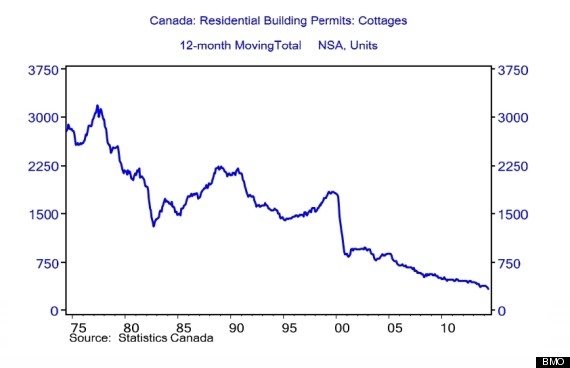It’s summer and Canadians are flocking to cottage country to soak up the sun, have some fun in the water and maybe knock back a few cold ones.
But there’s one thing they aren’t doing, and that’s building new cottages. In fact, cottage construction has been in decline for four decades, and is now getting perilously close to extinction.
“Building permits for cottages tallied just 335 units in the past year to June, extending a decades-long slide, as the readily-assessable supply of lake-front property declines,” BMO economist Sal Guatieri wrote in a recent note.
“We are now building about one-tenth as many cottages as in the mid-70s.”
![cottage building permits bmo]()
But people still seem to be going to cottage country, even if they aren't building new cottages. Guatieri suggests this lack of new supply accounts for rising prices in cottage country.
Prices in Muskoka, the popular cottage country north of Toronto, jumped 7 per cent this spring from a year earlier, and the average cottage now costs close to $500,000. But the number of sales was down four per cent from a year earlier.
Sales were up by jaw-dropping numbers in B.C.’s cottage countries this spring, up 59 per cent in the south Okanagan and nearly 54 per cent in the Kootenays, though those numbers are for all residential properties and not just cottages.
The exception may be Quebec’s Laurentians, where it’s undoubtedly a buyer’s market. In the popular resort town of Mont-Tremblant, there are so many cottages for sale it would take 29 months, on average, to sell one.
Those strong numbers outside Quebec are a relatively new phenomenon. The recreational property market suffered for years after the financial crisis of 2008-09, as cottages are considered a luxury and are among the first things consumers give up on when tough times arrive.
Guatieri doesn't go into why we're giving up on cottage construction, but here are a few untested ideas:
-- We're running out of space. Much of the waterfront property in rural areas within weekend-drive distance of cities has already been cottaged up.
-- We're moving into a sharing economy. With sites like Airbnb popping up, buying a house you'll use only a few weeks a year seems more unnecessary than it used to.
-- Buying condos, not building cottages, is the trend these days. CMHC says some 17 per cent of condos on the resale market are investor-owned. If you're a homeowner today looking to buy a second property, you may just choose a condo in the city you can easily rent.
Why do you think cottage construction has gone out of style? Let us know in the comments below.
But there’s one thing they aren’t doing, and that’s building new cottages. In fact, cottage construction has been in decline for four decades, and is now getting perilously close to extinction.
“Building permits for cottages tallied just 335 units in the past year to June, extending a decades-long slide, as the readily-assessable supply of lake-front property declines,” BMO economist Sal Guatieri wrote in a recent note.
“We are now building about one-tenth as many cottages as in the mid-70s.”

But people still seem to be going to cottage country, even if they aren't building new cottages. Guatieri suggests this lack of new supply accounts for rising prices in cottage country.
Prices in Muskoka, the popular cottage country north of Toronto, jumped 7 per cent this spring from a year earlier, and the average cottage now costs close to $500,000. But the number of sales was down four per cent from a year earlier.
Sales were up by jaw-dropping numbers in B.C.’s cottage countries this spring, up 59 per cent in the south Okanagan and nearly 54 per cent in the Kootenays, though those numbers are for all residential properties and not just cottages.
The exception may be Quebec’s Laurentians, where it’s undoubtedly a buyer’s market. In the popular resort town of Mont-Tremblant, there are so many cottages for sale it would take 29 months, on average, to sell one.
Those strong numbers outside Quebec are a relatively new phenomenon. The recreational property market suffered for years after the financial crisis of 2008-09, as cottages are considered a luxury and are among the first things consumers give up on when tough times arrive.
Guatieri doesn't go into why we're giving up on cottage construction, but here are a few untested ideas:
-- We're running out of space. Much of the waterfront property in rural areas within weekend-drive distance of cities has already been cottaged up.
-- We're moving into a sharing economy. With sites like Airbnb popping up, buying a house you'll use only a few weeks a year seems more unnecessary than it used to.
-- Buying condos, not building cottages, is the trend these days. CMHC says some 17 per cent of condos on the resale market are investor-owned. If you're a homeowner today looking to buy a second property, you may just choose a condo in the city you can easily rent.
Why do you think cottage construction has gone out of style? Let us know in the comments below.